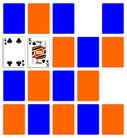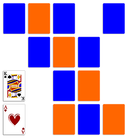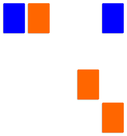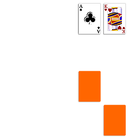Bully Card Game Instructions (Part 2)
Relocating Cards

During the course of a game, depleted spaces on the grid (ie; piles with no cards remaining) will occur. Even if there are several depleted spaces, the original grid of 5 across and 4 down, should remain intact.
After a play, a winning card may be relocated to depleted space if one is available. However, it may only be relocated immediately after winning a play and only to a space previously occupied by its own color on the grid. In the event of a tie, or multiple ties, all winning cards in question may be relocated to depleted spaces, even if the depleted spaces are created by relocating other winning cards. 2 or more winning cards may be interchanged if they are the last cards remaining in their respective piles. Remember, a card may only relocate to a depleted space, and never to a pile with existing cards. 
During the game, a card or pile may be or become isolated on the grid, with no opponent's cards surrounding it. An isolated pile remains isolated until an opponent's card relocates next to it. You may not initiate a play with an isolated pile. This includes each initiating card played in a tie.
|
Special Cases

If, towards the end of the game, no cards on the grid have adjacent opposing cards, the winning card of the last play must be relocated to a place on the grid where a play is possible. If a tie occurs on the only remaining playable cards and BOTH players have cards on other areas of the grid, the initiating player must relocate one of their other cards, challenging the opponent's other pile as a tie breaker to that bout.
If a player makes a mistake and accidentally turns over a card belonging to their opponent, the opponent immediately retaliates by choosing any of the first player's unexposed top cards and removing it from the grid. (the opponent may not take a card that is already exposed, such as in a tie) Play is then resumed with the first player, again, initiating. 
If a player makes an unintended play or accidentally exposes one of their top cards during their turn, they must play that card and cannot have a 'do-over'.
A player may respond to an initiated card by tapping a playable card without exposing it if its value is obvious to both players. If a card has just been played and the player wishes to play the card again, they may simply tap the card instead flipping it back and forth. Winning
A player wins the game when no opponent's cards remain on the grid and/or no more plays are possible.
Back to Part 1 |